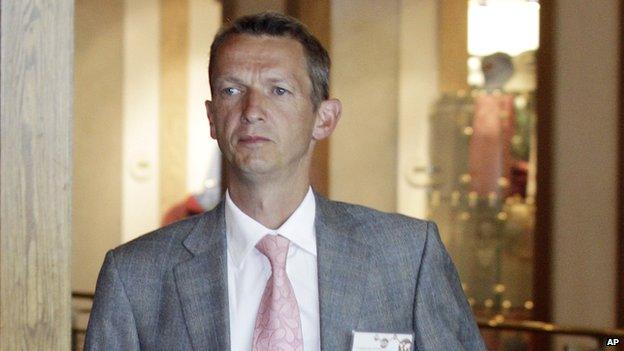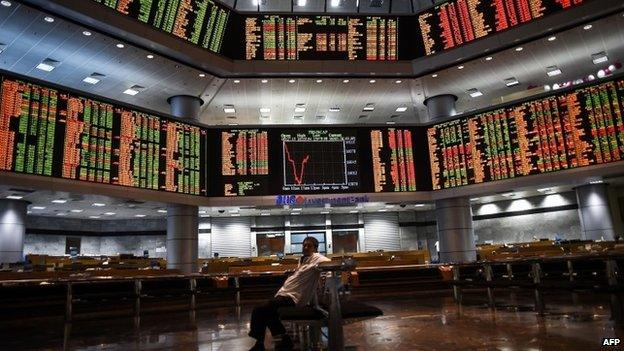Who owns a company, part 2?
- Published

Bank of England chief economist Andy Haldane's speech is an "insightful read"
We've seen many established pillars of society shaken and rattled in recent years. Now, it seems to be the turn of the public limited company.
My most recent posting was about the questioning of the dominance of shareholders, and the short-term demands for results, data, dividends and share buy-backs that they impose on company bosses.
As I wrote, this is being targeted by Hillary Clinton in her presidential campaign. It's being criticised by a senior figure at Blackrock, the biggest fund manager of them all.
And last week, the chief economist at the Bank of England, Andy Haldane, spoke to my colleague Duncan Weldon of Newsnight, and a BBC camera.
Having raised the subject, Mr Haldane dug into his files to unearth a speech he made in Edinburgh two months ago, and - rather oddly - it has been published today, external.
It expands on his brief BBC interview. And by the standards of economic texts, it's an accessible, interesting and insightful read. But if you don't have time, here's what I took from it.
Shares and shared risk
In considering the criticisms of modern company structures, it concludes with a majestic arboreal metaphor: "These criticisms have deep micro-economic roots and thick macro-economic branches. Some incremental change is occurring to trim these branches. But it may be time for a more fundamental re-rooting of company law if we are to tackle these problems at source."
The speech covers the history of how we got to the limited liability company in the mid-1800s, extending to finance after the collapse of the City of Glasgow Bank in 1878 (for which the directors were jailed).

Hillary Clinton is targeting the dominance of shareholders in her presidential campaign
By limiting downside risk, that made it more attractive for more people to invest. And the way things developed in the UK and USA, it was eventually assumed that the interests of the company were happily aligned with those of the shareholders.
With the passage of the 2006 Companies Act, that was set in statute and hard-wired into boardrooms.
This followed a review of company law which concluded that directors "were to serve the interests of shareholders, first and foremost, but also had to 'have regard' to wider interests, including employees, customers, suppliers and the wider community".
Making directors actually responsible to those other stakeholders would, it was argued, require them to take moral, political and economic decisions instead of business ones. "Having regard..." was left deliberately vague.
Banker bonus
One result of two centuries of rising shareholder dominance has been a rise in the share of profits that's distributed to shareholders, with share buybacks becoming a significant factor.
Another is that payment of senior executives has been increasingly in equity, reinforcing the shared interests of company and shareholder, but at the expense of others.

The banking crisis can be seen in this light, where risk was carried by wider society, and particularly the government, while the upside was for executive directors and investors.
Andy Haldane observes that the cost of the banking crisis in the US, UK and eurozone has been around a quarter of annual output. And over time, it's possible that the total cost, discounted to net present value, reaches an entire year's worth of gross domestic product.
There has been a lot of activity to make sure incentives within banking are no longer allowed to get so skewed. The bonus structures required for senior bankers have been altered to ensure they carry personal risk.
Loyalty share
By introducing delays before equity is handed over, and clawback if things go pear-shaped up to 10 years later, it aligns the time horizon of the chief executive and finance director with those of the shareholders, the bank and the economy.
And one innovation - though very limited so far - has been payment by "performance bond" or debt, rather than equity.
So a question raised by Andy Haldane is how much this should be extended beyond banks, so that other companies have to introduce longer-term incentives, where executives share their firms' risks and are less short-term in their horizons.
Just as the notion of a limited liability company was one imported into Britain in the 19th Century, there are new legal models for shareholding in other countries, from which we could learn.
France, for instance, has a special class of "loyalty share" for French-listed firms, doubling your voting rights if you held them for more than two years. Italy has a similar law.
Directors re-directed
In the US, there is experimentation with groups of longer-term investors having the right to appoint directors.
Haldane also cites Japanese research that demonstrated the different boardroom cultures in different countries.
Asked who owns companies, Japan was the only country where bosses did not say, overwhelmingly, that it is shareholders.
Then, asked whether employees' job security or shareholders interests should take priority, a clear majority of respondents in Japan, France and Germany backed the workers, while in the UK and US, it was a clear majority for the shareholders.
So, it doesn't have to be the way it is. And that's where the tree metaphor comes in.
The idea of uprooting the current system, and re-planting it where it can flourish alongside the interests of creditors, customers and employees may sound dangerously radical.
But it's coming from an influential source in a deeply conservative institution.